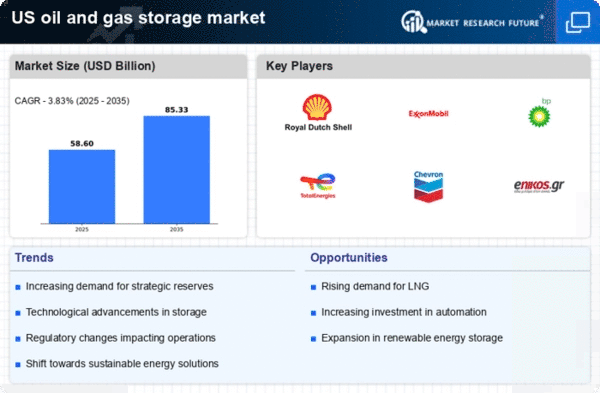Rising Crude Oil Prices
The oil and-gas-storage market is significantly influenced by fluctuations in crude oil prices. As of November 2025, crude oil prices have shown an upward trend, hovering around $80 per barrel. This increase in prices often leads to higher profit margins for storage operators, encouraging them to expand their facilities and services. The oil and-gas-storage market is likely to see a surge in demand for storage capacity as companies aim to capitalize on favorable pricing conditions. Additionally, the volatility in oil prices may prompt companies to stockpile reserves, further driving the need for efficient storage solutions. This dynamic creates a favorable environment for investment in the oil and-gas-storage market, as stakeholders seek to optimize their supply chains.
Growth of Renewable Energy Sources
The transition towards renewable energy sources is impacting the oil and-gas-storage market in various ways. As the U.S. government promotes the adoption of renewables, there is a growing need for storage solutions that can accommodate both traditional fossil fuels and emerging energy sources. The oil and-gas-storage market is likely to evolve as companies explore hybrid storage systems that integrate renewable energy technologies. In 2025, it is projected that renewable energy sources will account for approximately 30% of the U.S. energy mix, necessitating adaptable storage solutions. This trend may lead to increased investments in the oil and-gas-storage market, as stakeholders seek to diversify their portfolios and enhance their operational flexibility in response to changing energy landscapes.
Increasing Demand for Energy Security
The oil and-gas-storage market is experiencing heightened demand driven by the need for energy security in the United States. As geopolitical tensions and supply chain disruptions become more prevalent, stakeholders are increasingly investing in storage solutions to ensure a reliable energy supply. In 2025, the U.S. energy consumption is projected to reach approximately 100 quadrillion BTUs, necessitating robust storage capabilities. This demand for energy security is likely to propel investments in storage infrastructure, as companies seek to mitigate risks associated with supply volatility. Furthermore, the oil and-gas-storage market is expected to benefit from government incentives aimed at enhancing energy independence, which could further stimulate growth in this sector.
Environmental Regulations and Compliance
The oil and-gas-storage market is increasingly influenced by stringent environmental regulations aimed at reducing carbon emissions and promoting sustainability. In the United States, regulatory bodies are implementing measures that require storage facilities to adhere to stricter environmental standards. Compliance with these regulations often necessitates significant investments in infrastructure upgrades and technology enhancements. As of November 2025, it is anticipated that the oil and-gas-storage market will see a rise in demand for eco-friendly storage solutions, as companies strive to meet regulatory requirements. This shift towards compliance may also drive innovation within the industry, as firms seek to develop more sustainable practices and technologies that align with environmental goals.
Technological Innovations in Storage Solutions
Technological advancements are playing a crucial role in shaping the oil and-gas-storage market. Innovations such as advanced monitoring systems, automated inventory management, and enhanced safety protocols are being integrated into storage facilities. These technologies not only improve operational efficiency but also reduce costs associated with storage management. In 2025, it is estimated that the adoption of smart storage technologies could lead to a reduction in operational costs by up to 15% for storage operators. The oil and-gas-storage market is likely to benefit from these innovations, as they enable companies to optimize their storage capacities and respond more effectively to market demands. Furthermore, the integration of digital solutions may enhance the overall safety and reliability of storage operations.

















